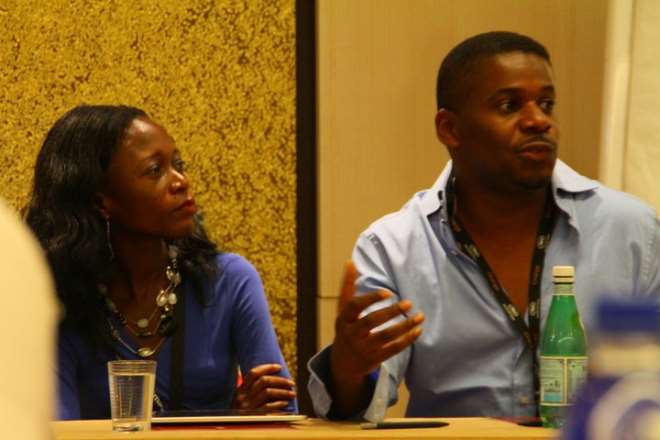GETTING TO KNOW AFRICAN FILMMAKERS WITH INTERNATIONAL RECOGNITION
Most of the filmmakers we know and admire are the many many "faithfuls" who have kept us in tune with movies that bring us great and good memories. These filmmakers deserve some serious credit because had it not been for them, the filmmakers I am about to list here below might not have had the courage to come home to tell stories with high budgets and elaborate appeal. I will humbly attribute their success to those filmmakers who kept the fire burning. BUT, those who kept the fire burning must realize that times are changing and so they must also change. Its not about popularity but about making quality films.
In no particular order, here are filmmakers who have made films that have crossed boundaries and have been recognized and given acclaim by other film industries to include Hollywood. Most of the profiles of these filmmakers I gathered from LA Times, Indiewire, Variety.com and Hollywood Reporter.
Honorable Mentions
Ousmane Sembene, Abderrahmane Sissako, Gaston Kabore.
Djo Munga
Djo Tunda Wa Munga is pretty much the entire film industry in the Democratic Republic of Congo, formerly called Zaire.
In fact, his acclaimed gangster film, "Viva Riva!," which opens Friday at the Nuart, is the first feature film shot in the country in 25 years. Djo is the director of the latest sensation in African films Viva Riva. I laugh when people complain about sex in our movies. Try watching Viva Riva. Varity calls it one sexy flick. "Viva Riva!" has already won numerous awards, including six major African Movie Academy Awards, the 2011 MTV Movie Award for best African film and best feature from the 2011 Pan African Film Festival in Los Angeles and also the MTV Movie Awards. The movie is currently screening in select US theaters soon to go to the UK and other countries. Djo Viva Riva has screened at Cannes, Toronto Film festival among other festivals. It was also given an honary screening at the national Black Arts Film Festival in Atlanta. Djo was a special guest speaker at the 2011 Diversity Panel at the cannes film festival where he spoke to filmmakers all around the world about film making in Africa.
Tunde Kelani
Tunde Kelani holds a diploma in the art and technique of film-making from the London International Film school, London.
After many years in the Nigeria Film industry as a cinematographer, he now manages Mainframe Film & Television Productions.
An outfit formed to document Nigeria's rich culture. Tunde Kelani has worked on most feature films produced in the country in his capacity as a cinematographer.
Some of his 16mm feature films include: ANIKURA, IREKE ONIBUDO, PAP AJASCO, KANNAKANNA, OGUN AJAYE, IYA NI WURA, TAXI DRIVER, IWA, FOPOMOYO. In the area of Video productions he has to his credit award-winning feature videos. TI OLUWA NILE (Part 1 - 3), AYO NI MOFE (Part 1 & 2), KOSEGBE, O LE KU, SAWOROIDE and now THUNDERBOLT. In addition to the M-NET short feature films: "TWINS OF THE RAIN FOREST" and "A PLACE CALLED HOME" . Tunde Kelani recently released "A BARBER'S WISDOM" another M-NET short feature in 35mm.
Hawa Essuman
Ghanaian-Kenyan filmmaker Hawa Essuman's foray into the moving image started as a trainee director for the television series Makutano Junction, by the second season she was the assistant director. She quickly gained the confidence and experience to venture into film and in 2009 completed Lift and Selfish. Hawa directed Soul Boy under the tutelage of German director Tom Tykwer who initiated the film workshop from which the film evolved. Soul has screened at major film festivals, making Hawa a celebrated african Filmmaker. the movie recently screened at the Rotterdam Film festival.
Wanuri Kahiu
(CNN profile) Kahiu, whose 2009's feature film debut "From A Whisper" triumphed at last year's African Movie Academy Awards (AMAA).
Born in Nairobi, the young filmmaker moved to the UK to study management science before relocating to Los Angeles to enroll on a filmmaking course. After working on movies like "The Italian Job" and "Catch A Fire," Kahiu decided to return to Kenya to chase her filmmaking dream, even though she knew it was not going to be an easy ride.
At the age of 29, she's already hailed as one of Africa's most aspirant directors, being part of a new, vibrant crop of talents representing contemporary African culture. Her films have been screened in high profile festivals, such as Sundance and the Berlinale, while earlier this March she was among an array of prominent international female directors to be invited to London's Birds Eye View film festival. She is also a winner of the Focus features Africa First program for her film Pumzi. Wanuri was the 2010 BAFTA/LA winner for her film From a Whisper.
Leila Djansi
Barely 2 years in the industry and Leila has been tagged the most controversial filmmaker. hate her or love her, she is the leading female filmmaker to come out of West Africa. The outspoken 29 year old, armed with an academic background of film and television from the Savannah College of art and design started her film career in the Ghana film industry. President of the Ghana Library Board Readers club for three years running, her sojourn in the industry began when a screenplay, Babina, for producer Akwetey Kanyi resulted in her first screen credit at the tender age of 19. Leila Djansi was honored for her film “I Sing of A Well”, at the Pan African Film Festival by the British Academy of Film And Television Arts (BAFTA) in Los Angeles in 2011. “I Sing of A Well” is the first film from the trilogy “Legion of Slaves”. The film was nominated for 11 AMAA awards in 2010. She followed that film with another hit Sinking Sands, which was an official selection at the Pan African Film festival, received 10 nominations at the 2011 AMAAs winning 3 and best Actress for first time big screen actress Ama K Abebrese. The film was screened at the prestigious Cannes film festival Marche du Film. Later in the year, she topped that with another adventurous venture with a new film Ties That Bind starring Kimberly Elise. Leila was also a special guest speaker at the Beyond Borders Diversity Panel at the 2011 Cannes Film festival. I sing of a well, with From a Whisper and Viva Riva were among the films given honorary screenings at the National Black Arts Film festival.
Fred Amata
Ever since ace Nigerian director Jeta Amata released his movie Black Gold, he has been winning accolades for himself and his country. The most recent reward for his efforts came on Saturday (July 9, 2011) at the American Black International Film Festival in Miami, where Black Gold won the Special Grand Jury Prize.The prize came with a cash award of $5000. On July 2, 2011, Jeta Amata received a Certificate of Special Congressional Recognition from the United States Congress. The award, which was signed by Laura Richardson, the member of Congress representing California's 37th District reads:
"For his continued commitment to protect the Niger Delta and dedication to the film project Black Gold: The Struggle for the Niger Delta an epic expose that will enlighten the global community about the truths of the Niger Delta. Coming from a family of veteran filmmakers (Ifoghale Amata, Zack Amata and Fred Amata), it is no surprise that he soars in the world of film and entertainment. Jeta, known for such movies as "The Amazing Grace", "Alexa Affair" and "Mary Slessor", is a renowned Nigerian filmmaker, who has received local and international acclaim. He rose to global prominence when he produced a film/documentary for the BBC, British Broadcasting Corporation in 2003 using his film "Game of Life" as footage for the documentary. Debuting his movie "Alexa Affair" at the Berlin film festival in 2004 set him firmly in the minds of Nigerians and the world forever as our own Nollywood success story. Jeta's The Amazing Grace which won the award as Best West African Film in 2006 Screen Nations Award UK is also the first Nigerian film to be screened at the prestigious Cannes film festival.
Fanta Nacro
In Burkina Faso, Fanta Regina Nacro is the first woman who entered the film world by doing an internship as a scripty of the movie "Daabo Yam" (Choice) conducted in 1986 by Idrissa Ouedraogo. Her first film was a short film made in 1992, " Un Certain Matin ", which won the" Silver Tanit "at Carthage. This is the first fiction directed by a woman in Burkina Faso and Fanta Regina Nacro for consecration.
With " Puk Nini "(1995), Fanta Regina Nacro was propelled into the big leagues and hailed as the representative of a" New African wave. " Her short film " Le Truc de Konate "(1998) on AIDS prevention, awarded in many international festivals, including the 1999 Fespaco and Short Film Festival Clermont-Ferrand reveals a filmmaker very involved. In most of her short films, Fanta Regina Nacro questions with humor the traditions of her country and the complex relationship between tradition and modernity. For her film, " Bintou ", produced as part of the series" Mama Africa ", Fanta Regina Nacro was inspired by her mother's struggle for recognition of its role in society. This medium-length fiction has won over twenty awards at international festivals. Ultimate accolade, the film was selected for the Directors' Fortnight in Cannes 2001 and won the Best Short Film at Fespaco 2001. With her film " Living positively "(2003) Fanta Regina Nacro addresses issues related to AIDS and signed a manifesto against emotional release and self-assertion. In 2004, Fanta Regina Nacro shot her first feature film, " The Night of Truth " which received a screening at tribecca.
some of you might be upset to not see some names on this list. The list if not for people who have made movies outside Africa with foreign acts. its more about filmmakers who have been endorsed by the people who endorse people. So, if I have not mentioned your favorite filmmaker, encourage him to spread his wings and get endorsed. there are many filmmakers outside the people whose films we see in our homes everyday. Most of the people mentioned up here make movies for festivals. Films we call art-house films. The films that have a significant African identities, no western spices. The future of African Film.
© 2011 Nollywoodgists.com. All rights reserved. This material may not be published, broadcast, rewritten or redistributed without the express written consent of the publisher
Latest News
-
 "If You're For Me, I Am For You" - Cubana Chief P
"If You're For Me, I Am For You" - Cubana Chief P -
 "3 Days To Go" - Femi Adebayo Urges Fans To Get S
"3 Days To Go" - Femi Adebayo Urges Fans To Get S -
 "Stop Asking Me Questions About Speed Darlington"
"Stop Asking Me Questions About Speed Darlington" -
 "Benue Is The Most Underdeveloped State I've Ever
"Benue Is The Most Underdeveloped State I've Ever -
 Stan Alieke Urges Young Professionals To Take Lin
Stan Alieke Urges Young Professionals To Take Lin -
 Chizzy Alichi Teases Fans With Baby Reveal, Promot
Chizzy Alichi Teases Fans With Baby Reveal, Promot -
 "I'm Not Wearing Makeup From July 4th Till Decemb
"I'm Not Wearing Makeup From July 4th Till Decemb -
 "Stop The Challenge Of Mocking Kids With Down Syn
"Stop The Challenge Of Mocking Kids With Down Syn -
 Regina Daniels Celebrates Sons As They Mark Birthd
Regina Daniels Celebrates Sons As They Mark Birthd -
 Speed Darlington Threatens To Sue NAPTIP For Defam
Speed Darlington Threatens To Sue NAPTIP For Defam














